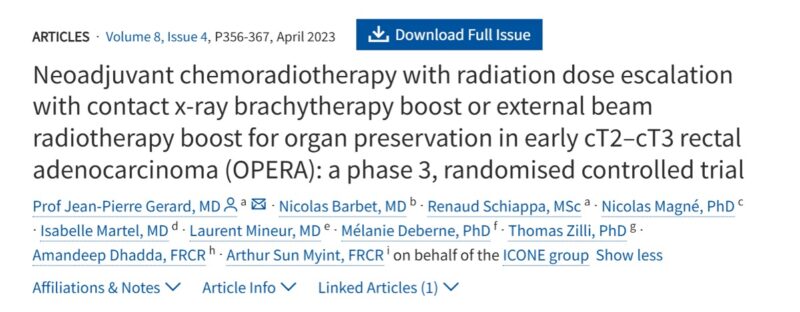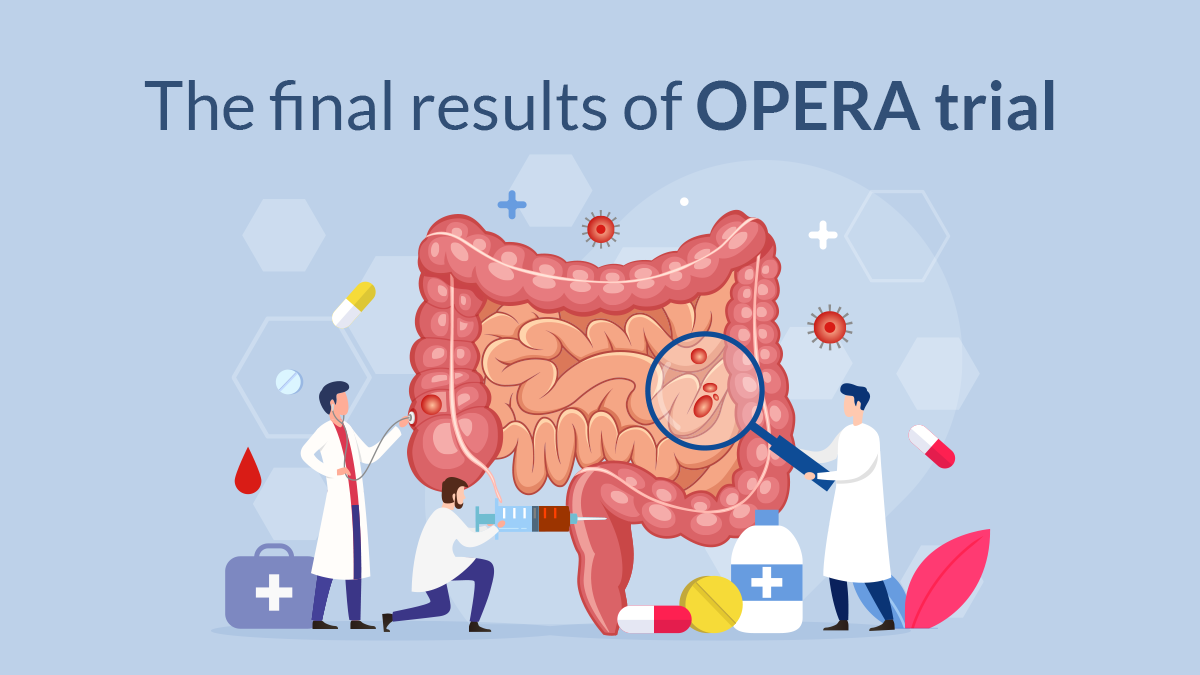The OPERA trial, a multicenter phase III study, included patients with operable cT2-cT3b low- to mid-rectal adenocarcinoma (ADK), tumors smaller than 5 cm, and cN0 or cN1 (with lymph nodes <8 mm).
On November 10, 2024, the 5-year results of the OPERA trial by D. Baron et al. were published in ESMO Annals of Oncology.
Authors: D. Baron, T. Pace Loscos, R. Schiappa, N. Barbet, E. Dost, S. Ben Dhia, S. Soltani, L. Mineur, I. Martel, S. Horn, C. Picardi, A. Stewart, E. Cotte, R. Coquard, G. Baudin, L. Evesque, A. Dhadda, A. Sun Myint, J.P. Gérard, J. Doyen

All participants underwent external beam radiotherapy (EBRT) at 45Gy in 25 fractions, along with concurrent capecitabine. They were then randomly assigned to one of two groups: Group A received a boost with EBRT (9Gy/5 fractions), and Group B received a boost with contact X-ray brachytherapy (CXB) at 90Gy/3 fractions. The primary goal was to assess the organ preservation (OP) rate.
The first results of the OPERA trial (Organ Preservation in Early cT2–cT3 Rectal Adenocarcinoma) were published in April 2023.
Authors: Jean-Pierre Gerard, Nicolas Barbet, Renaud Schiappa, Nicolas Magné, Isabelle Martel, Laurent Mineur, Mélanie Deberne, Thomas Zilli, Amandeep Dhadda, Arthur Sun Myint,

Of the 148 patients randomized, 141 were eligible for analysis. Between weeks 14 and 24, a clinical complete or near-complete response occurred in 64% of patients in Group A and 92% in Group B (p<0.001). The 3-year OP rate was 59% for Group A compared to 81% for Group B (p=0.003).
– After a median follow-up of 61.1 months (range: 56.8-64.5), the 5-year local regrowth rate was 39% in Group A and 17% in Group B (p=0.1).
– The difference in OP rates remained highly significant, with Group A achieving 56% and Group B 79% (p=0.004).
– This difference was even more striking for tumors smaller than 3 cm, with Group B showing an OP rate of 93% compared to 54% in Group A.
Out of 28 cases of local regrowth, 3 occurred after 3 years of follow-up. The most common late side effect observed was rectal bleeding (grade 1-2), but this generally resolved within three years. Notably, bowel function was not worsened by the CXB boost.
These results demonstrate that CXB boosts, when combined with neoadjuvant chemoradiotherapy, significantly improve the organ preservation rate in early-stage rectal adenocarcinoma.
Discussions and posts highlighting OPERA Trial:
“New article in press: A phase III randomized trial on the addition of a contact x-ray brachytherapy boost to standard neoadjuvant chemo-radiotherapy for organ preservation in early rectal adenocarcinoma: 5 year results of the OPERA trial.”
“5-year OPERA results out and continue to show higher organ pres with brachy boost: 79% vs 56% at 5 years.
With initial pub, concern re: late tox (64% brachy arm with Gr 1-2 rectal bleed), but by 3 year, bleeding resolved in 80%. No Gr 4-5 AE, LARS similar.
Both groups did well: 5-year organ preservation was 56% for chemoRT arm (without brachy).
Remember these patients only got radiosensitizing chemo, no FOLFOX. Yet results are similar to OPRA, suggesting this trial really did enroll lower risk patients.
Worth noting the really outstanding results for tumors smaller than 3 cm: in brachy boost arm, 93% 5-year OP and only 3% regrowth rate. So, most of these patients can be cured/keep their rectums with essentially RT alone.
In contrast, there was no SS improvement in organ pres with brachy boost for tumors >3 cm: 57% vs. 67% (p=0.17), suggesting larger tumors need additional therapy (such as chemo).
One caveat is that local excision was an option for patients with cCR or nCR and also for those experiencing local regrowth – and I believe these patients were still counted as having organ pres. Most centers manage local regrowth with TME.
Lastly, 3 of 28 cases of local regrowth occurred beyond 3 years, showing importance of continued surveillance (in OPRA, 99% of regrowths were caught in 3 years).
The study first came out in 2023.”
“Interesting results from the Phase III OPERA trial show that adding contact X-ray brachytherapy (CXB) to chemoradiotherapy in early rectal adenocarcinoma significantly improves outcomes.
Key statistics:
– 5-year organ preservation rate: CXB 79% vs. 56% (p=0.004).
– For tumors <3 cm: CXB achieves a 93% preservation rate vs. 54%.
– Complete or near-complete clinical response by weeks 14-24: 92% with CXB vs. 64% (p<0.001).
– 3-year organ preservation: CXB 81% vs. 59% (p=0.003).
Controlled side effects: rectal bleeding (grade 1-2) decreased after 3 years, with no impact on bowel function.
CXB offers new hope for organ preservation, especially in small tumors, with close monitoring advised.”
“RCT on the addition of a contact x-ray brachy boost to std neoadjuvant CTRT for organ preservation in early rectal ca: 5 year results of the OPERA trial All results in favour of contact xray brachy boost
– Ccr 64% vs 92%
– 5year preservation rate 56% vs 79%.”
“As a radiation therapist, I pride myself on knowing much of the current practices for common treatment sites and staying up to date on randomized trial results – I’d never heard of the OPERA trial though.
OPERA investigators aimed to determine if adding an x-ray contact brachytherapy boost (before or after neoadj chemorads) would improve organ preservation in patients with early-stage rectal cancers.
Simul’s post of this trial explores the results, what this could mean for our patients, the impact of brachytherapy on clinical operations, and future steps towards developing greater interest in brachytherapy.
And as always- subscribe!”
Further Reading:
Rectal Cancer in Adults: What patients should know about
Rectal Cancer in Children: What patients and caregivers should know about


